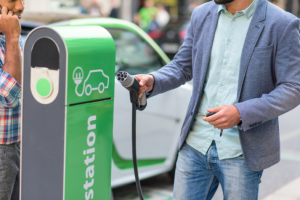Have you seen the spiking petrol prices these days, well don’t you wish that you owned an electric car? Or maybe you have just bought one; they are all the thill these days. Cost-effectiveness, less pollution generator, owning an electric vehicle might help you sleep stress-free at night.
But even so, don’t you wonder how much better they are? How much would it cost you to charge an electric car? Well, we have the answer to that…
How Much Charge Would An Electric Car Need, And How Much Does It Cost On Average
1. Charging at Home

Electric cars seldom need complete charging since they don’t usually get empty; a simple top-up would do it most of the time. Charging an electric car at home costs somewhere around £9.20 for a full charge. Usually, we suggest overnight charging for smooth travel if you get an electric car. Waking up to a full battery makes sure you don’t have to look for a charging port on-road gas stations, which sometimes can be very hard to find.
In the UK, the average domestic electricity rate has risen from 17kWh to 18.9 p/kWh for 2021. Fully charging an electric car will cost you hence, £9.00 to £9.99, based on area. This provides your vehicle with 200 miles of travel, which is pretty impressive.
2. Charging At Work

Have you seen your co-workers bringing their new electric cars to work while you still drive around in old petrol or diesel ones? Well, chances are, your workspace provides charging for these cars free or at meager rates. Companies and small businesses in the UK are now well caught up with the times; everyone wants to reduce polluting gases emissions. So they have come up with a plan to push their employees to go green.
Yes, you guessed it, they provide free charging for your vehicles. It’s a great deal. You go to work, park your car and charge it free in the parking lot. Electric car charging points are put up all around these lots these days. So it might be that charging an electric car is free after all.
3. Charging At Public Locations

Have you gone for a vacation or just a visit to the park? The government is all for green vehicles these days. They want you to use an electric car more than anyone else. And what better way is there to persuade you than to provide free charging ports. Yes, it’s accurate; all around the UK, public parks travel destinations are now being supplied with free charging ports.
Some hotels even provide this to encourage you to drive your electric car there instead of petrol ones.
4. Rapid Charging

If you travel a lot, you probably will use the rapid charging port installed in motorway stations. They range from being free to quite expensive. Not the best way for charging as per us, but you could still try and see.
As per the name, you may have guessed, these charging ports only need 30 minutes and give you on an average 90 to 100-mile charge. THey cost around £6-7 or 266p/kWh for 30 minutes. These sites have tariffs fixed by individual operators based on an average rate. However, some car brands might give you free charges if you are their customer.
Although a bit costly, you might never need rapid charging for your electric car. Usually not used daily, Rapid charging is for long journeys, in which case they come much handy.
So, Is Charging An Electric Car Cheaper Than A Petrol Car
Let us first compare these two. We have already seen how cost-efficient charging an electric car is. You can set up an electric vehicle even free of cost in some places. On the other hand, petrol or diesel-run cars have been around forever. We see the spike in petrol prices now and then, the long lines at petrol pumps.
The average UK driver, owning a diesel or petrol car, spends £1,435 a year even when the price of diesel is comparatively less than petrol. While the average electric car owner, using both rapid charging points and home charging, spends an average of approximately £510 a year.
So you must have figured it out by now, charging an electric car is much more profitable in the long run than filling up a vehicle with petrol. Although electric cars may be costlier to buy, they are most cost-efficient.
How To Spend Even Less Charging An Electric Car!

You might not know this, but the rates change based on the time. As skeptical as this sounds, you could charge your electric car for a much lower price if you charge at the right time in the UK. Charging costs more during peak day hours, 12 am to 7 pm. The price is the highest per kWh at this hour. While if you charge at night, typically between 10 pm to 7 am, you could be saving a lot more money. The off-peak charge costs around £0.09 per kWh, and during off-peak hours cost just around £0.02 per kWh.
Is Charging An Electric Vehicle Easy?
Have you bought an electric vehicle and are not sure how to charge it? Well, it is pretty straightforward. Even beginners should have no problem charging electric cars after doing it once. Usually, the port comes installed with the electric car. The drive train capacity is what the time is taken to charge depends on. You have to set the power you want, and there are settings that need to be looked at. But one look at the manual, you can do it quickly. In stations, a worker would be available to help you as per your model and type.
If you look at all these statistics, you would see that an electric car is a better decision. Long-time profit, easy charging, and a better night’s sleep knowing you helped decrease the emission of harmful carbon gases. And the cost of charging an electric car is friendly for your pocket.









